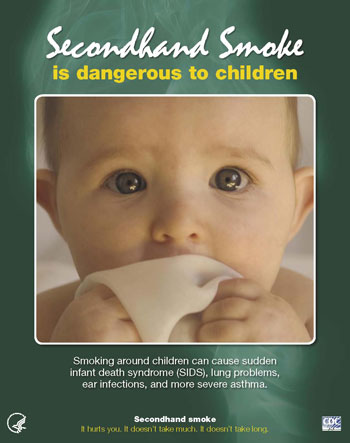 January 15, 2010 - Cape Town Child Welfare and the National Council Against Smoking have again urged adults to refrain from smoking near children after an admission by Cape Town's traffic services that it was unable to enforce a law against smoking in a vehicle where a child younger than 12 was present.
January 15, 2010 - Cape Town Child Welfare and the National Council Against Smoking have again urged adults to refrain from smoking near children after an admission by Cape Town's traffic services that it was unable to enforce a law against smoking in a vehicle where a child younger than 12 was present.
Background: Vehicles have been found to be the most dangerous space for second-hand smoke levels. Kids exposed to smoke are at higher risk since they breathe in more air by weight than adults. Both the respiratory rate and heart rate are higher in children below the age of 13 than in adults. The younger the child, the greater the potential for exposure. Since the lungs of children are still developing, exposure to second-hand smoke can lead to ear infections, asthma, bronchopneumonia and other illnesses.
Two pieces of legislation that dramatically increase smoking fines and crack down on tobacco companies were signed into law, the South Africa's National Council Against Smoking stated on September 1, 2009. Map - South Africa.. The amendments also banned smoking in cars in which children younger than 12 are passengers and put a stop to the sale of products such as sweets and chocolates by cigarette vendors.
Cape Town Child Welfare chief executive Niresh Ramklass said on Tuesday, January 12th that with 700 000 vehicles on the roads the legislation was unenforceable, and issued an appeal: "Please consider the children's health. Secondary smoke (second hand smoke, SHS, environmental tobacco smoke, ETS, sidestream smoke, involuntary smoking) is lethal for the child."
His comments followed a statement by city traffic services spokesperson Merle Lourens noting that traffic officers did not pay attention to people who smoked in cars with children. Lourens said officers focused on driving offences because these posed a greater danger.'We won't be able to stop people smoking' "I doubt if anybody is paying attention to people smoking in cars when there are children. We won't be able to stop people smoking," she said.
Tobacco control laws were strengthened in August, 2009 to include a ban on smoking in all places (including private homes) where children are present. Restaurant or bar owners who allow smoking in non-smoking areas face fines of up to R50 000 and the individual smoker can be fined R500.
National Council Against Smoking executive director Yussuf Saloojee said: "We accept that traffic officers have more urgent work, but during the stopping of vehicles and at roadblocks they should just check for smoking as a matter of routine." He agreed the law was difficult to enforce, but said it had "a great educational effect" .
About establishments that failed to comply, Saloojee said: "We need a proper survey. What we have is anecdotal evidence."
Reference: Is smoking law of no effect?, Aziz Hartley, IOL.co.za, 1/13/2010 (originally published on page 1 of Cape Times on January 13, 2010).
South Africa related news briefs:
South Africa - BAT wants court to lift ban on "one-to-one" communication with smokers..;
South Africa - new anti-smoking laws have to be enforced..;
Swedish Match finalizes sale of South African operation to PMI..;
South Africa - tobacco control legislation signed into law..; South Africa - survey of youngsters smoking and drinking hablits..;
Reynolds Tobacco is now providing coupons for a free can of Camel SNUS;
British American Tobacco (BAT) - 100 years in Africa..;
BAT Marketing Tobacco Products Using Text Messaging...


0 comments:
Post a Comment